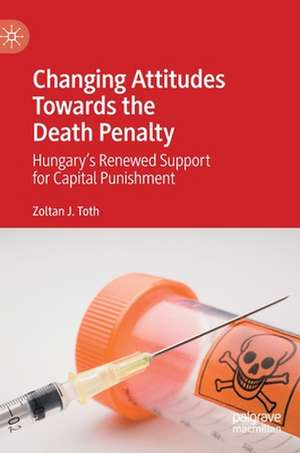Changing Attitudes Towards the Death Penalty: Hungary’s Renewed Support for Capital Punishment
Autor Zoltan J. Tothen Limba Engleză Hardback – 12 iun 2020
Preț: 641.20 lei
Preț vechi: 754.36 lei
-15% Nou
Puncte Express: 962
Preț estimativ în valută:
122.71€ • 127.64$ • 101.30£
122.71€ • 127.64$ • 101.30£
Carte tipărită la comandă
Livrare economică 15-29 aprilie
Preluare comenzi: 021 569.72.76
Specificații
ISBN-13: 9783030475567
ISBN-10: 3030475565
Pagini: 212
Ilustrații: VI, 212 p.
Dimensiuni: 148 x 210 mm
Greutate: 0.44 kg
Ediția:1st ed. 2020
Editura: Springer International Publishing
Colecția Palgrave Macmillan
Locul publicării:Cham, Switzerland
ISBN-10: 3030475565
Pagini: 212
Ilustrații: VI, 212 p.
Dimensiuni: 148 x 210 mm
Greutate: 0.44 kg
Ediția:1st ed. 2020
Editura: Springer International Publishing
Colecția Palgrave Macmillan
Locul publicării:Cham, Switzerland
Cuprins
1. Introduction.- 2. The Deterrent Effect – From An A Priori Logic.- 3. Capital Punishment As An Inhumane Punishment.- 4. Necessity Or Lack Of Need For Capital Punishment.- 5. Miscarriage Of Justice.- 6. The Goal Of Punishment.- 7. Economic Considerations.- 8. Other Reasons For And Against Capital Punishment.- 9. Statutory Regulation Of Capital Punishment In Hungary During The Horthy Era And World War II.- 10. The Death Penalty In The Years After Liberation From Nazi Occupation And During The Establishment Of The Soviet Dictatorship.- 11. Capital Punishment In The First Decade Of State Socialism.- 12. Capital Punishment In The 60’s And 70’sThe Act No. IV Of 1978 On The Criminal Code Of Hungary.- 14. The End Time Of The Death Penalty In Hungary: Two Steps Of The Abolition In 1989/90.- 15. Public Opinion In Hungary In The Light Of The Current Legal Situation And The Facts About Trends In Murder Rates.- 16. Revived Debate On The Death Penalty In The Political Scene.
Notă biografică
Zoltan J. Toth is Associate Professor in the Faculty of Law at Karoli Gaspar University of the Hungarian Reformed Church, Budapest, Hungary.
Textul de pe ultima copertă
This book explores the pros and cons of the death penalty and the history of capital punishment. In this context, it puts a special emphasis on the situation in Hungary, where, amongst its neighbors, in recent years the demand for the reestablishment of the death penalty has received the strongest political support from many pro-government politicians. Toth presents tendencies toward abolition of the death penalty and to analyze the arguments by which the death penalty can, in principle, be criticized or even defended. The book presents the main issues of the death penalty, arguments of both abolitionists and retentionists, and reviews the modern history of this sanction. The monograph does not seek to convince the reader of the correctness or wrongness of the death penalty, but is specifically intended to present the arguments and counter-arguments objectively, without bias, reviewing the standpoints of both sides authentically, leaving the reader the right to choose and allowing discussion and argumentation to be informed.
Caracteristici
Provides an objective analysis, weighing the pros and cons of the death penalty objectively Uses the case study of Hungary to explore cases where capital punishment has re-entered political discourse Offers a historical overlook as capital punishment as a practice, in Europe specifically
